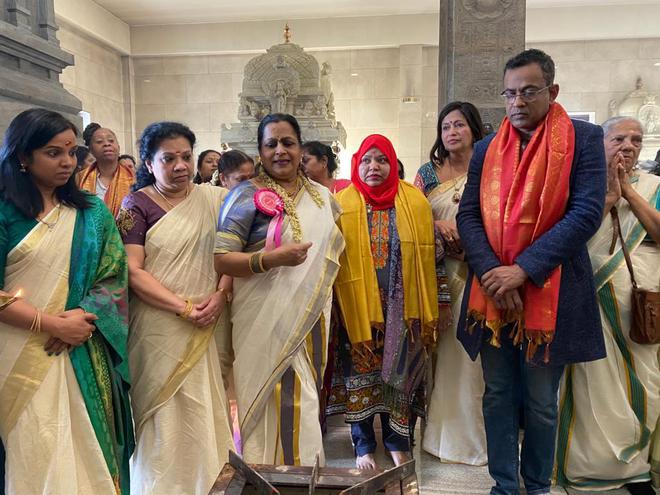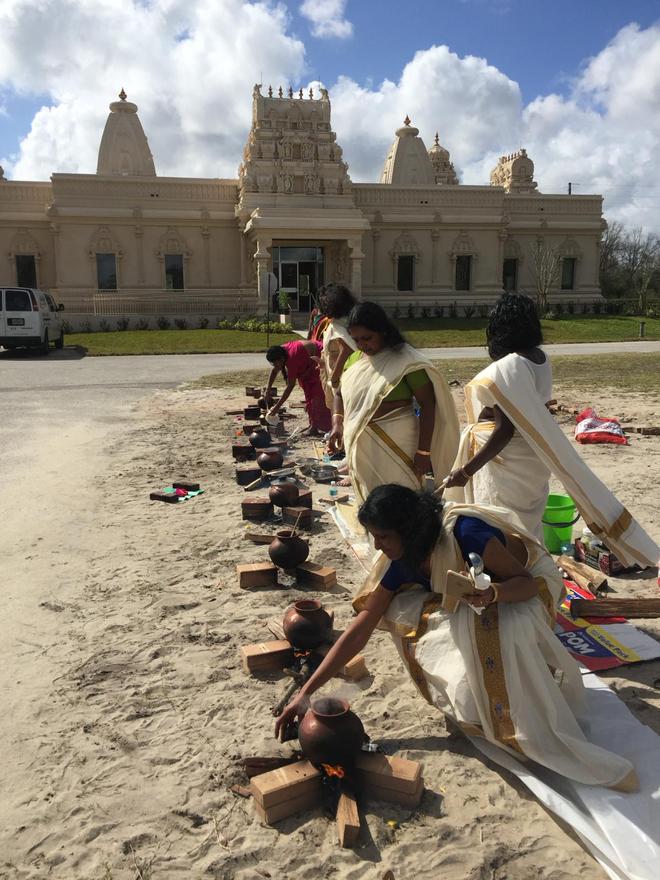It is that time of the year when thousands of women from India and abroad congregate for the annual festival of the Attukal Bhagavathy Temple in Thiruvananthapuram.
Today (on February 25), the heart of the city turns into a giant kitchen where women worship the Mother Goddess by cooking Pongala (rice cooked with jaggery and ghee, and garnished with cashewnuts and raisins) and other rice-based dishes such as Therali appam, Mandaputtu (Rice cakes steamed in leaves of cinnamon malabatrum and steamed balls of rice powder, green gram, coconut and jaggery flavoured with cardamom ) etc on open hearths. The ritual entered the Guinness Book of World Records for being the largest religious gathering of women on a single day.

Over time, the Pongala has gone international with the Malayali diaspora taking it to the US and the UK. Although several non-resident Keralites make it a point to be in the State for the festival, those who were not able to travel began doing it in their kitchens as a mark of their devotion.
Author Omana Gangadharan, former civic Mayor of Newham, London, recalls that during a media interaction, actor-politician Suresh Gopi had asked her if she could organise something to observe the Attukal Pongala celebration in the UK.
Also read | Attukal Pongala: Kerala Health department implementing action plan
“That motivated me to approach the London Sree Murugan Temple to request if five of us could offer Pongala on the day of the Attukal Pongala in Thiruvananthapuram. I never thought they would agree to it. But they agreed happily. We were able to offer Pongala in 2009 and from then on, it just got bigger every year,” she recalls, speaking on the phone from the UK, where she resides.
Since the law does not permit open fires, the Pongala is cooked in a giant pot with 10 kilograms of rice on the premises of the temple.

“Everyone would like to get a turn to stir the Pongala. But to prevent any untoward incidents, we permit only a handful of volunteers to do it. Once all the ingredients are added and the mixture begins to thicken, the men pitch in to stir it and turn it over in the pot,” says Omana. Food is served to all the people attending the celebration.
Even snow and freezing winds have not stopped devotees from attending the festival. Decked in traditional wear (mundum-neriyathu), the women come from all part of the UK, says Omana. She adds that now there are similar celebrations organised in a couple of other temples in the UK.
Across the Atlantic, in the US, Dr. Jaisy Baiju is among a handful of women who began celebrating the festival on the premises of the temple of the Hindu Society of central Florida, Orlando, in 2015.
“Since Florida has a tropical climate, we are able to cook the Pongala on open hearths as it is done in Thiruvananthapuram. There is a year-long preparation for the Pongala,” she says.
A majority of the women are working and they take leave well in advance to participate in the fete.

This year, perhaps for the first time, the Kerala Hindus of North America Women Forum is organising the festival in several states in the US.
Geetha, who runs an NGO, says it was Devi Pillai, a friend who hails from Attingal, Thiruvananthapuram, who motivated them to begin the celebration in Orlando. Earthen pots and ingredients were sourced from a shop specialising in Indian provisions.
“Without Jaya Mohandas, a nurse, and her husband, Mohandas, we would not be able to do it. All the year around, they collect the spathes and fronds to light the open hearths for the Pongala. They collect it from different places in Florida and keep it ready for the festival,” adds Geetha.
She asserts that although many Malayalis celebrate Indian festivals during weekends, they insist on celebrating the Attukal Pongala on the same day as it is held in Thiruvananthapuram. Jaisy adds: “Of course, the time zones are different. So, while many of you are resting after the Pongala, we might be beginning the day for the festival. But the fervour is the same!”







